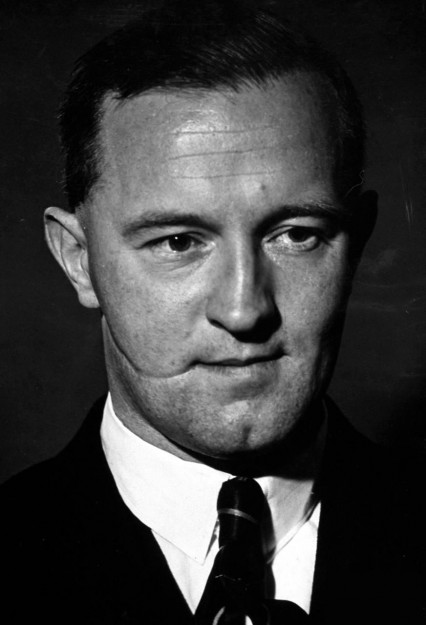
William Joyce
On the cold and damp morning of 3 January 1946 a large but orderly crowd had formed outside the grim Victorian prison in Wandsworth. The main gates of London’s largest gaol are situated not more than a few hundred feet from the far more salubrious surroundings of Wandsworth Common in South West London.
Some people had come to protest at what they considered an unjust conviction, while others, ghoulishly and morbidly, wanted to be as close as they could, to what would turn out to be, the execution of the last person to be convicted of treason in this country.
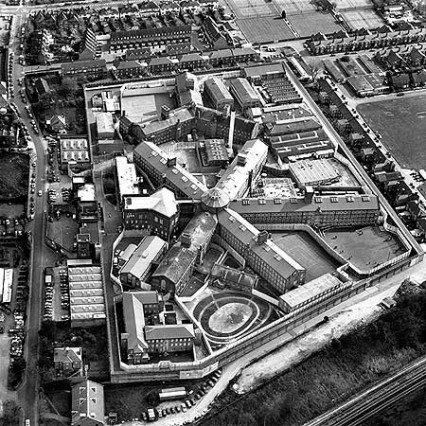
Wandsworth Prison
William Joyce had woken early that morning and although he ate no breakfast he drank a cup of tea. At one minute to nine, an hour later than initially planned, the Governor of Wandsworth Prison came to the condemned man’s cell to inform him that his time had come.
The walk to the adjacent execution chamber was but a few yards but there was just enough time for Joyce to look down at his badly trembling knees and smile. Albert Pierrepoint, the practiced and experienced hangman, said the last words that Joyce would ever hear: ‘I think we’d better have this on, you know’ and placed a hood over the condemned man’s head followed immediately by the noose of the hanging rope.
A few seconds later the executioner pulled a lever which automatically opened the trap door beneath Joyce’s feet. Almost instantaneously Joyce’s spinal cord was ripped apart between the second and third vertebrae and the man known throughout the country as Lord Haw-Haw, was dead.
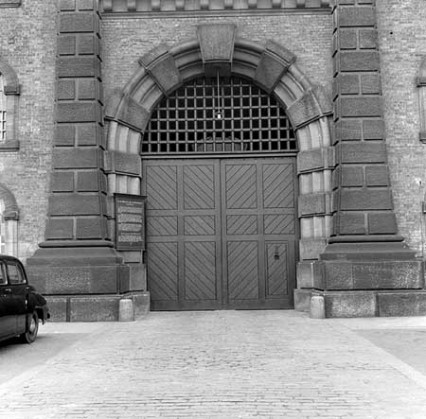
The gates of HMP Wandsworth around the time of William Joyce's execution
At about the same time as the hangman pulled his deadly lever a group of smartly dressed men in winter coats stepped away from the main crowd outside the gates of the prison and behind some nearby bushes, almost surreptitiously, were seen to raise their right arms in the ‘Heil Hitler!’ salute.
At eight minutes past nine a prison officer came out and pinned an official announcement that the hanging of the traitor William Joyce had taken place. At 1pm the BBC Home Service reported the execution and read out the last, unrepentant pronouncement from the dead man;
In death, as in this life, I defy the Jews who caused this last war, and I defy the power of darkness which they represent. I warn the British people against the crushing imperialism of the Soviet Union. May Britain be great once again and in the hour of the greatest danger in the west may the Swastika be raised from the dust, crowned with the historic words ‘You have conquered nevertheless’. I am proud to die for my ideals; and I am sorry for the sons of Britain who have died without knowing why.
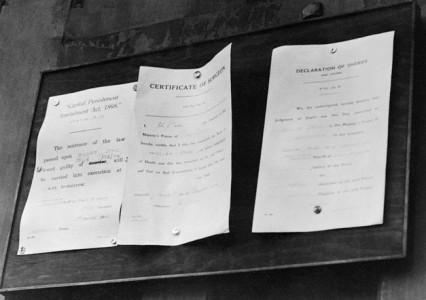
The official declaration of William Joyce's execution pinned on the gates of the prison
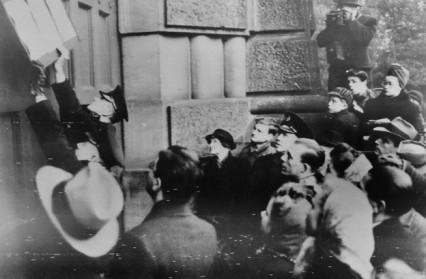
The official notice of execution being pinned on the gates of Wandsworth Prison
William Joyce had actually been born in Brooklyn, New York forty years previously to an English Protestant mother and an Irish Catholic father who had taken United States citizenship. A few years after the birth the family returned to Galway where William attended the Jesuit St Ignatius College from 1915 to 1921. William had always been precociously politically aware but both he and his father, rather unusually for Irish Catholics at the time, were both Unionists and openly supported British rule.
In fact Joyce later said that he had aided and ran with the infamous Black and Tans, the notoriously indisciplined and brutal British auxiliary force sent to Ireland after the First World War in an attempt to help put down Irish nationalism. Joyce actually became the target of an IRA assassination attempt in 1921 when he was just sixteen.
For his own safety William immediately left for England, and after a short stint in the British army (he was discharged when it was found he had lied about his age) he enrolled at Birkbeck College of the University of London where he gained a first but also developed an initial interest in Fascism.
In 1924, while stewarding a Conservative Party meeting at the Lambeth Baths in Battersea, a seventeen year old Joyce was attacked by an unprovoked gang in an adjacent alley-way and received a vicious and deep cut from a razor that sliced across his right cheek from behind the earlobe all the way to the corner of his mouth. After two weeks in hospital he was left with a terrible and disfiguring facial scar. Joyce was convinced that his attackers were ‘Jewish communists’ and the incident became a massive influence on the rest of his life.
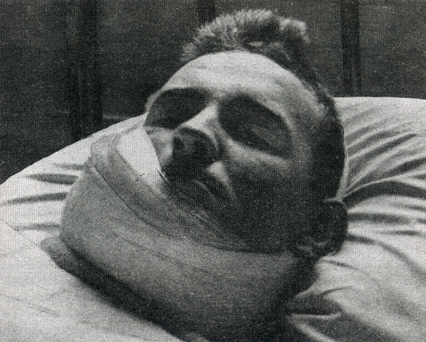
The bandage was covering twenty six stiches, he remained in hospital for two weeks
In 1932 Joyce joined Oswald Mosley’s British Union of Fascists and within a couple of years he was promoted to the BUF’s director of propaganda and not long after appointed deputy leader. Joyce was a gifted speaker and for a while became the star of the British fascist movement. He was instrumental in moving the union towards overt anti-semitism – something of which Mosley had always been relatively uncomfortable.
Joyce’s career with the British Union of Fascists only lasted five years when, with membership plummeting, a devastated Joyce was sacked from his paid position in the party by Mosley in 1937.
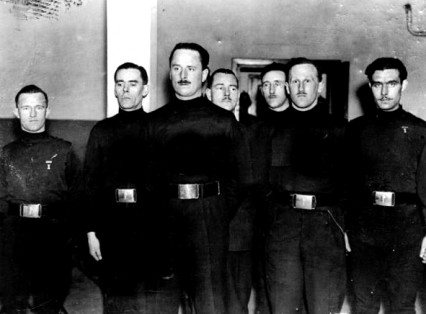
William Joyce, on the far left, with Oswald Mosley in 1934
In late August 1939, shortly before war was declared and probably tipped off by a friend in MI5 that he was about to be arrested, Joyce and his wife Margaret fled to Germany. Joyce struggled to find employment until he met fellow former-Mosleyite Dorothy Eckersley who got him recruited immediately for radio announcements and script writing at German radio’s English service in Berlin.
Crucially this was at a time when his British passport was still valid (although born in New York and brought up in Ireland Joyce had lied about his nationality to obtain a British passport – complications and niceties such as proving one’s identity with a birth certificate weren’t needed at the time) ostensibly to accompany Mosley abroad in 1935.
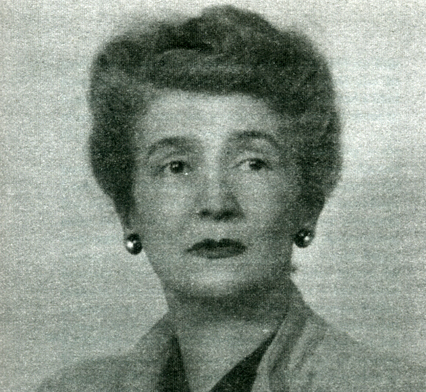
Dorothy Eckersley
The infamous nickname of ‘Lord Haw Haw’, associated with William Joyce to this day, was coined by a Daily Express journalist called Jonah Barrington. It’s not widely known but the title was actually meant for someone else completely – almost certainly a man called Norman Baillie-Stewart who had been broadcasting in Germany from just before the war. The nickname referenced Baillie-Stewart’s exaggeratedly aristocratic way of speaking. Barrington had written:
A gent I’d like to meet is moaning periodically from Zeesen [the site in Germany of the English transmitter]. He speaks English of the haw-haw, dammit-get-out-of-my-way variety, and his strong suit is gentlemanly indignation.
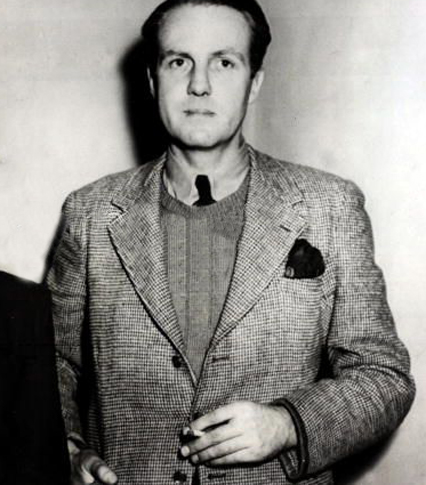
Norman Baillie-Stewart - the real Lord Haw Haw
Baillie-Stewart had already been convicted as a traitor by the United Kingdom for selling military secrets to Germany in the early thirties. He had the dubious distinction of being the last person in a long line of infamous people to have been imprisoned in the Tower of London for treason.
Late in 1939 when William Joyce had become the more prominent of the Nazi propaganda broadcasters, although at the time no one knew who he was, Barrington swapped the title over to Joyce.
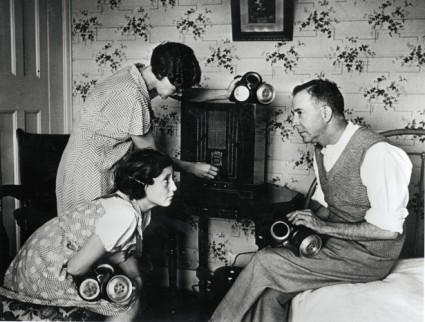
Listening to Lord Haw Haw’s broadcasts (which famously always began with the words “Germany Calling, Germany Calling”) was officially discouraged, although incredibly about 60% of the population tuned in after the BBC news every night. The BBC’s output at the beginning of the war was said to have been exceedingly dreary (plus ca change) and the British public seemed to prefer being shocked rather than bored.
Lord Haw Haw’s over-the-top and sneering attacks on the British establishment were really enjoyed, but in an era of state censorship and restricted information, there was also a desire by listeners to hear what the other side was saying. At the start of the war, simply because there was more to brag about, the German news reports were considered, by some people, to contain slightly more truth than those of the BBC.
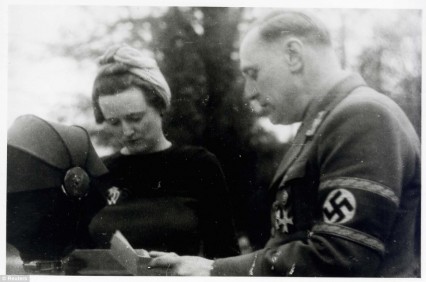
William and Margaret Joyce in Germany
As the tide turned in the latter stages of the war Joyce and his wife moved to Hamburg. On the 22nd April 1945 he wrote in his diary:
Has it all been worthwhile? I think not. National Socialism is a fine cause, but most of the Germans, not all, are bloody fools.
Eight days later, and on the very day that Adolf Hitler and Eva Braun committed suicide in their Berlin Bunker, Joyce made his last drunken broadcast – the remains of his Irish accent can be heard through his slurring voice.
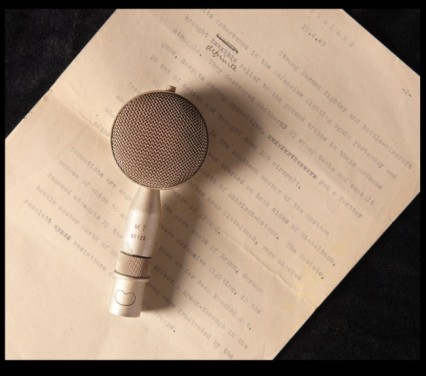
The actual microphone and a script used by Joyce for his German broadcasts
At the end of the war William and his wife Margaret fled to a town called Flensburg near the German/Denmark border and it was there, in a nearby wood, that Joyce was captured by two soldiers. They, like Joyce, were out looking for firewood. Joyce stopped to say hello and one of the soldiers asked “You wouldn’t by any chance be William Joyce, would you?”. To ‘prove’ otherwise, Joyce reached for his false passport and one of the soldiers, thinking he was reaching for a gun, shot him through the buttocks, leaving four wounds.
The arrest was utter poetic justice. The soldier who had shot the infamous broadcaster was called Geoffrey Perry, however, he had been born into a German jewish family as Hourst Pinschewer and had only arrived in England to escape from Hitler’s persecutions. So in the end a German Jew, who had become English had arrested an Irish/American who pretended to be English but had become German.
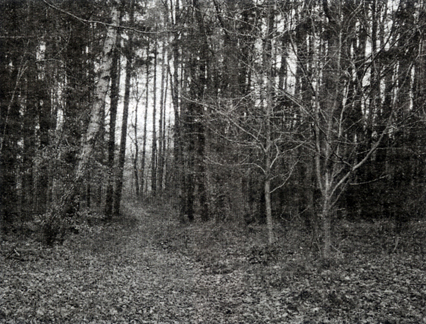
The Woods near the German/Denmark border where Joyce was shot and arrested
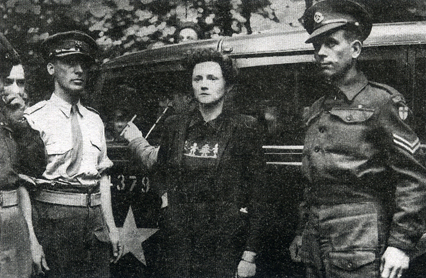
Margaret Joyce at her arrest in 1945
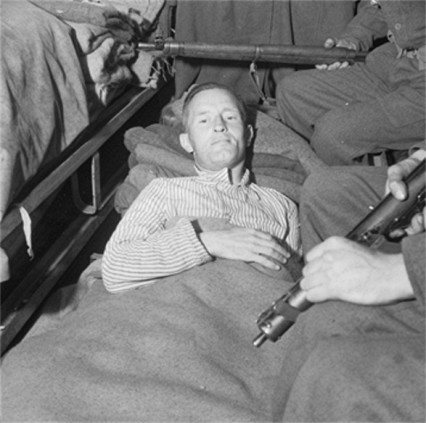
A well-guarded William Joyce after his arrest in Germany 1945
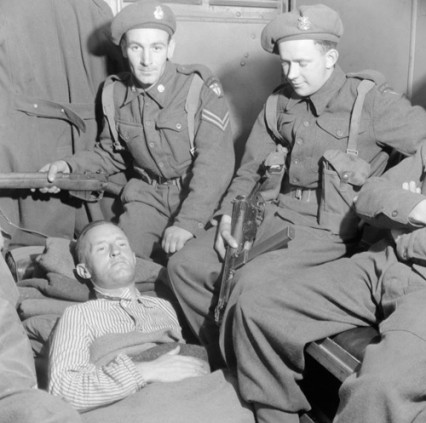
Back in London, he was charged at Bow Street Magistrates court and in the dock he quietly stated “I have heard the charge and take cognisance of it.” He was subsequently driven to Brixton Prison in a Black Maria and on arrival, he said “So this is Brixton.” “Yes,” retorted his guard, “not Belsen.”
The trial of William Joyce began on 17 september 1945 and for a short period of time, when his American nationality came to light, it seemed that he might be acquitted. “How could anyone be convicted of betraying a country that wasn’t his own?” It was argued. However, the Attorney General, Sir Hartley Shawcross, successfully argued that Joyce’s possession of a British passport (even if he had misrepresented himself to get it) entitled him to diplomatic protection in Germany and therefore he owed allegiance to the King at the time he started working for the Germans.
It was on this contrived technicality that Joyce was convicted of treason on 19th September 1945. The penalty of which, of course, was death.
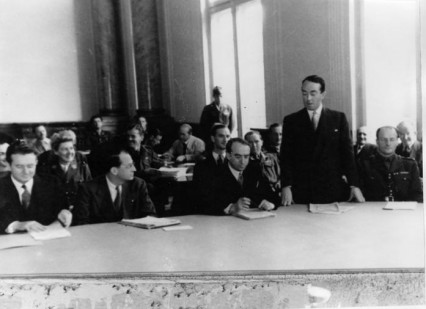
Sir Hartley Shawcross, he later said that the trial of William Joyce was not one of which he was especially proud
A sizeable minority of the population were uncomfortable with the verdict mainly because of the nationality issue but also because he was alway seen as a bit of a joke-figure rather than someone trying to bring the country down. On Christmas day 1945 an accountant named Edgar Bray wrote to the King:
I know nothing about Joyce, and nothing about his Politics. I don’t know much about Law either, but I do know enough to be firmly convinced that we are proposing to hang Joyce for the crime of pretending to be an Englishman which crime, so far as I am aware, in no possible case carries a Capital penalty. It happens to be just our bad luck, that Joyce actually WAS an American, (and now IS a German subject), but that is no reason to hang him, because we are annoyed at our bad luck.
The historian AJP Taylor made the point that Joyce was essentially hanged for making a false statement on a passport – the usual penalty for which was a paltry fine of just two pounds.
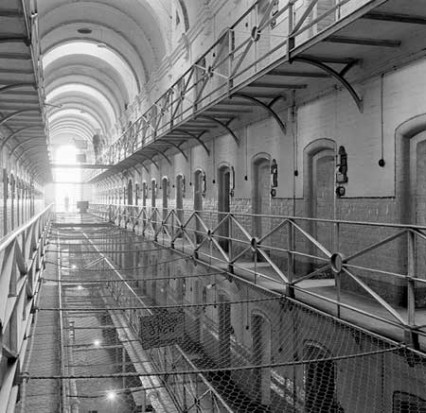
Interior of Wandsworth Prison
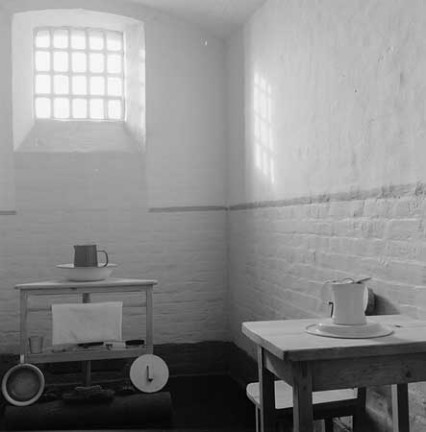
A cell in Wandsworth Prison in the late 1940s
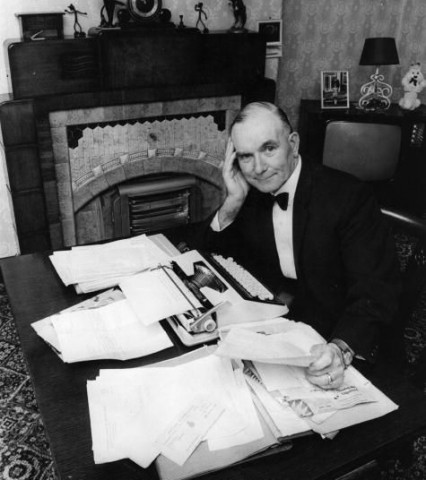
Albert Pierrepoint
Not long after Albert Pierrepoint’s expert execution and with the blood from Joyce’s scar, that had burst open during the hanging, still dripping onto a spreading red stain on the canvas floor, the body was taken to the prison mortuary. A coroner pronounced that the death was due to “injury to the brain and spinal cord, consequent upon judicial hanging”.
There were specific rules pertaining to the burial of executed prisoners at the time, and William Joyce’s body was treated as any other. True to the normal rules he was buried within the Wandsworth Prison walls, in an unmarked grave, and was allowed no mourners. The body was dumped in the middle of the night, literally unceremoniously, on top of the remains of another man, a murderer called Robert Blaine who had been hanged five days previously.
In total 135 people were hanged at Wandsworth Prison during the nineteenth and twentieth centuries, with the final execution taking place when Henryk Niemasz was hanged on 8 September 1961 for murder of Mr and Mrs Buxton in Brixton.
Incidentally the gallows at Wandsworth were not dismantled until 1993, 29 years after the last execution in this country and 24 years after the death penalty was abolished for murder. Incidentally the death penalty still existed for treason until 1998.
The condemned cell is now used as a television room for prison officers.
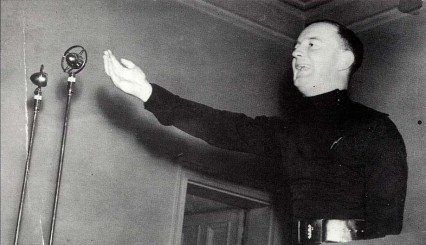
Lord Haw Haw pontificating
